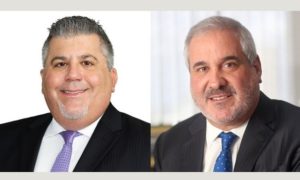

Business interruption litigation is primed to grow in the fourth quarter and 2021 as business owners continue to sue their insurers for denying pandemic-related claims. Now, attorneys at law firms litigating the claims say their hands are full as they devote more resources to these cases as well as professional liability claims that stem from the pandemic.
“As a strictly defense firm, with our primary source of clients being insurance companies, what we get is dictated by claims that insurance companies are going to get,” said Michael Packer, office managing attorney at Am Law 200 firm Marshall Dennehey Warner Coleman & Goggin and co-chair of the firm’s insurance services practice group, in an interview. “As these claims progress, we are seeing an uptick, whether it’s a situation where businesses either close temporarily or shut down completely.”
Packer also predicted an uptick in professional liability claims in 2021 and 2022; some of those claims will be related to the results of business interruption lawsuits.
“Going into 2021 and 2022, we expect a significant increase in errors and omissions claims because as COVID-19 claims get denied by insurance companies, [the insured] are going to turn on agents and brokers for allegedly not advising them as to the proper insurance to buy,” Packer said. He added that he expects a similar uptick at the firm’s employer liability group as employees exposed to COVID-19 sue their employers for allegedly exposing them.
Marshall Dennehey last month announced six new associates in its Fort Lauderdale offices, but Packer said those hires are related to demand in first-party litigation, which he partially attributed to hurricanes. Packer, who declined to discuss billing rates for insurance litigation, said that despite the increase in liability and business interruption litigation, he doesn’t expect the firm to immediately staff up to accommodate these new filings.
On the plaintiff’s side, Miami litigation boutique Podhurst Orseck has seen a “rather large” increase in demand for business interruption insurance litigation. “It’s been a big-time commitment in the last six months,” said partner Steven Marks in an interview.
About nine of Podhurst Orseck’s 14 attorneys are working on business interruption cases, said Marks. Overall, the boutique is working on about 40 business interruption cases—most of which are on contingency—and has rejected more than 200 potential cases.
“We are being very selective on which business interruption cases we’re bringing: only those that do not have any pandemic or viral exclusion,” he said.
Podhurst Orseck’s contingency litigation can yield high payouts for the firm, Marks said, but is especially risky for the firm in the context of business insurance. “The scope of the damages, the risk of government interference or regulations or protections exist here where you don’t normally have that kind of risk,” Marks said, but also adding “there’s a concern that the insurers we sue may not survive this.”
As of early October, around 1,300 businesses had sued their insurers for failing to cover losses related to the pandemic, including lost business income, extra expenses incurred and government closures of establishments, according to data from a Covid coverage litigation tracker from the University of Pennsylvania Carey Law School.
Filings peaked at 60 to 70 new cases per week in May and June and slowly declined through July and August, although September and early October saw 14 to 24 cases filed per week. Eight insurers have more than 50 lawsuits pending against each of them, according to the most recent Penn Law data, with Hartford Financial Services Group seeing the most lawsuits at 206.
Early court opinions are promising for insureds with policies that don’t specifically exclude pandemic-related damages from coverage. In September, a Missouri federal court opined that a group of Missouri hair salons and restaurants were rendered unusable by the pandemic, rejecting The Cincinnati Insurance Cos.’ dismissal motion.
Firms like Podhurst Orseck are also filing class action cases against insurers, hoping to group policyholders with identical or similar policies from the same insurer. Marks is representing the Miami Beach salon Atma Beauty in a case against HDI Global Specialty in a case that, “if successful, would reach tens, if not hundreds of thousands of businesses insured with that particular insurer,” Marks said.
The firm is also litigating a business interruption-based class action case against Lloyd’s in the Southern District of New York.
At least 330 class action lawsuits for business interruption claims are pending against many major insurers, according to information provided to the DBR by Carlton Fields class action attorney Julianna Thomas McCabe. Those insurers include Lloyd’s London, Cincinnati Insurance and Chubb Ltd.
Copyright 2020. ALM Media Properties, LLC. All rights reserved.